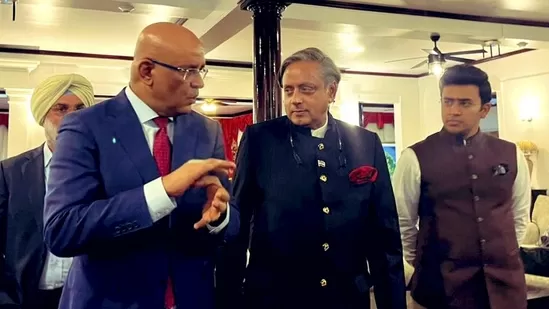In a resolute diplomatic offensive against cross-border terrorism, Indian Member of Parliament Shashi Tharoor led a multi-party delegation to Guyana, reinforcing New Delhi's uncompromising stance against terrorism emanating from Pakistan. Speaking in Georgetown, Tharoor emphasized that India will not only pursue those who perpetrate attacks but also confront entities financing, training, and arming such operatives. The delegation’s visit was part of a broader international outreach following Operation Sindoor, in which Indian forces reportedly neutralized several terrorist bases. Guyanese leaders reaffirmed their support for India's position, aligning themselves with its broader campaign to establish a new global norm against terrorism.
India’s Diplomatic Offensive in the Caribbean
India has intensified its global outreach to garner support for its evolving security doctrine centered on preemptive and retaliatory measures against cross-border terrorism. On May 25, Congress MP and senior diplomat Shashi Tharoor, during his visit to Guyana, delivered a sharp rebuke to state-sponsored terrorism, underscoring India’s right to respond decisively to threats to its sovereignty.
Tharoor, addressing the Indian diaspora and Guyanese leadership in Georgetown, conveyed New Delhi’s unyielding resolve: India will not allow its civilians to be targeted without consequence. His remarks signaled an elevation in diplomatic rhetoric, intended to strengthen international awareness of the mechanisms behind terrorist activities in the region.
“New Normal” Against Terrorism
Tharoor stressed that India, having endured over four decades of terrorist threats and attacks, has entered an era of “resolved determination.” No longer will acts of terror across India’s borders be met with restraint or mere condemnation, he noted.
“We will never let anybody believe they can just walk across the border and kill our civilians and get away with impunity,” Tharoor declared. “We must not only bring the perpetrators to justice but also directly challenge the networks that finance, train, and direct these attackers.”
This new diplomatic language underscores a shift toward a policy of deterrence and retribution, which New Delhi hopes will become an international template for counterterrorism efforts.
Delegation Composition and Strategic Mission
The bipartisan delegation accompanying Tharoor was composed of leaders from a spectrum of Indian political parties, including the Bharatiya Janata Party (BJP), Lok Janshakti Party, Telugu Desam Party, Shiv Sena, Jharkhand Mukti Morcha, and others. Notably, the group also included Taranjit Singh Sandhu, former Indian Ambassador to the United States.
Their primary objective was to articulate India’s security and foreign policy strategy in the aftermath of Operation Sindoor—a military campaign that reportedly dismantled nine terrorist camps in Pakistan and Pakistan-occupied Kashmir. The delegation sought to communicate India’s firm posture following these strikes and underscore the necessity of coordinated global action against state-sponsored terrorism.
Operation Sindoor: A Strategic Signal
According to diplomatic sources, Operation Sindoor was launched in response to recent escalations, including the Pahalgam terror incident. The Indian military executed precise strikes targeting terrorist training facilities and critical infrastructure used by armed groups in Pakistan.
While India successfully repelled retaliatory measures, the operation served a dual purpose—neutralizing immediate threats and broadcasting a clear message to adversaries: any aggression against Indian civilians or forces will be met with equal or greater force.
Guyana’s Support for India’s Anti-Terrorism Stance
In a series of high-level meetings, the Indian delegation engaged with Guyana’s Vice President Bharrat Jagdeo and Prime Minister Mark Phillips. Both leaders expressed unequivocal support for India's counterterrorism campaign and its broader geopolitical concerns, including the status of the Indus Waters Treaty and regional security dynamics.
“The Vice President reiterated Guyana’s unwavering support for India’s fight against terrorism,” the Indian High Commission in Georgetown posted on social media, following the official exchange.
This endorsement not only solidifies diplomatic ties between India and Guyana but also demonstrates a growing international consensus that aligns with India’s narrative on counterterrorism.
Conclusion
Shashi Tharoor’s visit to Guyana represents more than a symbolic gesture; it is part of a broader recalibration of India’s foreign policy aimed at reshaping global counterterrorism norms. Through coordinated diplomacy, military precision, and strategic messaging, New Delhi is crafting a new doctrine: acts of terror, particularly those enabled by state actors, will not go unanswered.
As India continues to build alliances and articulate its zero-tolerance approach abroad, the message is clear—cross-border terrorism will be met with international exposure, military retaliation, and unwavering diplomatic resolve.

Comments